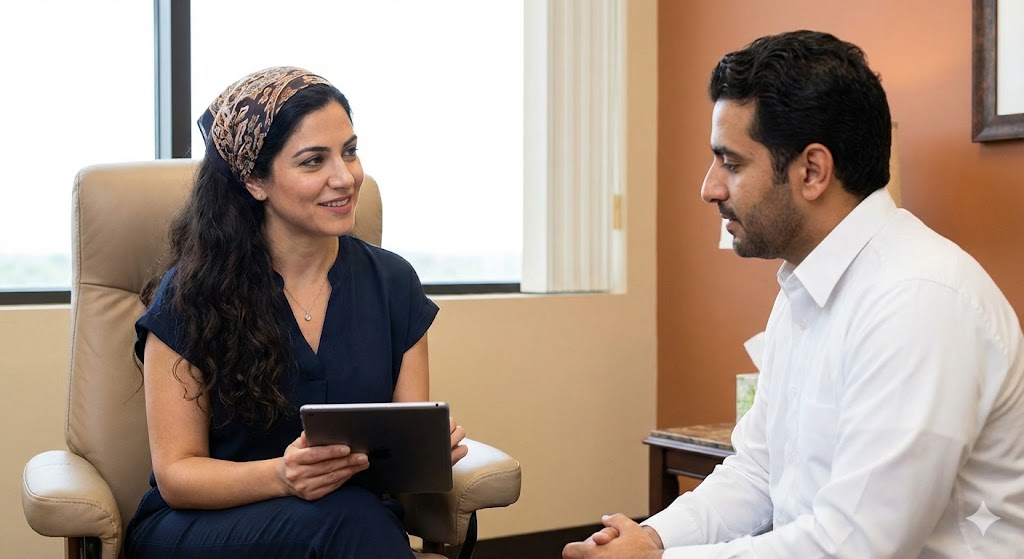Tips for Talking to Your Doctor About Depression
By Elite Psychiatry | October 26, 2024
How to Discuss Depression with Your Doctor at Elite Psychiatry Center
Depression can feel like a heavy fog, clouding everything you do and making it hard to see a way out. It can be tough to take the first step toward getting help, especially when it comes to talking to your doctor. But reaching out is crucial! Whether you’re feeling overwhelmed or just a bit off, sharing your feelings with a professional can lead to positive changes. In this article, we’ll provide you with some handy tips for discussing depression with your doctor at Elite Psychiatry Center in Sugar Land.
Understanding Depression
Before you walk into that appointment, it helps to have a solid understanding of what depression is and how it can manifest in your life.
What Is Depression?
Depression isn’t just feeling sad. It’s a complex mental health disorder that can affect your thoughts, feelings, and behaviors. You might find yourself feeling hopeless, losing interest in things you once loved, or struggling with everyday tasks.
Common Symptoms
Recognizing the symptoms can help you articulate what you’re experiencing. Here are some common signs:
The Importance of Talking to Your Doctor
Opening up about your feelings can be intimidating, but it’s one of the best ways to get the help you need.
Why Open Communication Matters
Your doctor is there to listen and help. When you talk about your symptoms, they can tailor a treatment plan that suits your needs.
Overcoming Stigma
There’s still a stigma surrounding mental health, but it’s essential to remember that seeking help is a sign of strength, not weakness. Many people are facing similar struggles; you’re not alone.
Preparing for Your Appointment
Preparation can ease anxiety about discussing such personal issues. Here’s how to get ready:
Make a List of Symptoms
Before your appointment, jot down the symptoms you’re experiencing. This will help you remember everything when you’re in the doctor’s office.
Reflect on Your Feelings
Take some time to think about how you’ve been feeling. Are there triggers? Have there been changes in your life that contributed to your mood?
Set Goals for the Visit
Decide what you want to achieve from the appointment. Are you looking for a diagnosis, treatment options, or just someone to talk to? Knowing your goals can keep the conversation focused.
How to Start the Conversation
Getting the ball rolling can be the hardest part, but here are some tips to help you break the ice:
Be Honest and Direct
Start by stating how you’ve been feeling. Something like, “I’ve been feeling really low lately,” can set the tone for an open discussion.
Share Specific Examples
Don’t just tell your doctor you’re feeling down. Share specific instances where you felt particularly affected. This can provide context and help them understand your situation better.
Use “I” Statements
Using “I” statements can make your feelings clearer and less accusatory. For example, “I feel overwhelmed when I have too much to do” instead of “You don’t understand how busy I am.”
Discussing Treatment Options
Once you’ve shared your symptoms, it’s time to explore how to move forward.
Ask About Different Approaches
Inquire about various treatment options. Different approaches, including therapy, lifestyle changes, or medication, might work for you.
Inquire About Medication
If medication is recommended, ask about the benefits and potential side effects. Understanding how medication works can help ease concerns.
Explore Therapy and Counseling
Discussing therapy options can be beneficial. Cognitive-behavioral therapy (CBT) and other modalities can help manage depression alongside medication.
After Your Appointment
The conversation doesn’t end when you leave the office. Here’s what to do next:
Follow Up on Recommendations
If your doctor recommends follow-up appointments or specific treatments, make sure to schedule them and keep track of any changes.
Keep a Journal
Documenting your feelings and experiences can help you see patterns and provide valuable information for your next appointment.
When to Seek Immediate Help
In some cases, immediate help is necessary. Here’s when to reach out:
Signs of a Crisis
If you’re feeling like you might hurt yourself or others, it’s crucial to seek immediate help. Call your doctor, a trusted friend, or a crisis hotline.
Elite Psychiatry Center Serving the Crossing Cove At Riverstone Community and Beyond in Sugar Land
Elite Psychiatry Center is dedicated to serving the diverse needs of the Sugar Land community, including individuals residing in neighborhoods like Crossing Cove At Riverstone. With its convenient location near landmarks such as Malika’s Henna Art and major intersections like Hollow Tree Dr & Archer Meadow Ln (coordinates: 29.558855935717148, -95.59069133289893), we offer Depression Doctor Sugar Land services.
Get a Depression Doctor at Crossing Cove At Riverstone Now
Navigate from Crossing Cove At Riverstone to Elite Psychiatry Center Now
Taking the First Step: How to Discuss Depression with Your Doctor
Talking to your doctor about depression can feel daunting, but it’s a crucial step toward feeling better. At Elite Psychiatry Center in Sugar Land, our team is ready to support you. Remember, you deserve to feel good, and there are people who want to help. Take that first step today, and let’s work together toward brighter days.
Frequently Asked Questions
How can I prepare for my doctor’s visit?
You can prepare by listing your symptoms, reflecting on how you’ve been feeling, and setting clear goals for your appointment.
What if my doctor doesn’t take my concerns seriously?
If you feel your concerns are not being taken seriously, don’t hesitate to seek a second opinion. You deserve to have your feelings validated.
How often should I see my doctor for depression?
This depends on your individual needs. Some people may need weekly visits at first, while others may benefit from monthly check-ins.
Can I talk to someone else about my depression?
Absolutely! Talking to trusted friends or family members can be beneficial, but make sure you’re also consulting a mental health professional.
What are the next steps after my diagnosis?
After a diagnosis, your doctor will discuss treatment options, which may include therapy, medication, or lifestyle changes. Following a treatment plan is key to managing your symptoms.
“From mental health heredity to fostering understanding and support, our guidance spans generations. We’re here to assist with every aspect of mental health.”
Or Call Us Now!






